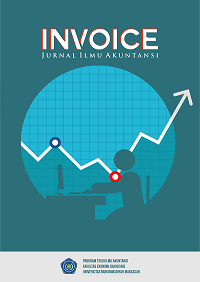PENGARUH IDEALISME, RELATIVISME, PENDIDIKAN ETIKA BISNIS, DAN LOVE OF MONEY TERHADAP PERSEPSI ETIS MAHASISWA AKUNTANSI TENTANG KRISIS ETIKA AKUNTAN (Studi Kasus Pada Mahasiswa Akuntansi UST)
DOI: https://doi.org/10.26618/inv.v3i2.6031
Abstract
Penelitian ini bertujuan untuk menguji apakah idealisme, relativisme, pendidikan etika bisnis, dan love of money berpengaruh terhadap persepsi etis mahasiswa akunntansi tentang krisis etika akuntan. Metode yang digunakan dalam penelitian ini yaitu metode deskriptif dan primer dengan kuesioner. Penelitian mengambil sampel 80 mahasiswa akuntansi di Universitas Sarjanawiyata Tamansiswa. Tehnik pengambilan sampel menggunakan purposive sampling. Pengumpulan data dilakukan dengan menyebarkan kuesioner kepada responden menggunakan google form. Dalam penelitian ini, data dianalisis dengan menggunakan analisis regresi linear berganda. Hasil penelitian ini menunjukkan bahwa (1) variabel idealisme berpengaruh positif terhadap persepsi etis mahasiswa akuntansi tentang krisis etika, (2) variabel relativisme berpengaruh positif terhadap persepsi etis mahasiswa akuntansi tentang krisis etika, (3) Variabel pendidikan etika bisnis tidak berpengaruh terhadap persepsi etis mahasiswa akuntansi tentang krisis etika akuntan, dan (4) variabel love of money berpengaruh negative terhadap persepsi etis mahasiswa akuntansi tentang krisis etika akuntan.
References
Akuntansi, Etis Mahasiswa. 2015. “1 Hitung 2 ).” IV.
Ariyanti, Ni Made Hanny, and A.A.G.P Widanaputra. 2018. “Pengaruh Idealisme, Relativisme, Dan Etika Pada Persepsi Mahasiswa Akuntansi Atas Perilaku Etis Akuntan.” E-Jurnal Akuntansi 24: 2197.
Damayanthi, Putu, and Gede Juliarsa. 2016. “Pengaruh Idealisme, Relativisme, Pengetahuan, Gender Dan Umur Pada Perilaku Tidak Etis Akuntan.” E-Jurnal Akuntansi 15(1): 1–16.
Dzakirin, M Khairul. 2013. “Orientasi Idealisme, Relativisme, Tingkat Pengetahuan, Dan Gender: Pengaruhnya Pada Persepsi Mahasiswa Tentang Krisis Etika Akuntan Profesional.” Jurnal Ilmiah Mahasiwa FEB: 1–25.
Ekonomika, Fakultas, D A N Bisnis, and Universitas Diponegoro. 2014. 3 Diponegoro Journal of Accounting Analisis Pengaruh Love of Money Terhadap Persepsi Etis Mahasiswa Akuntansi.
Elias, Rafik Z., and Magdy Farag. 2010. “The Relationship between Accounting Students’ Love of Money and Their Ethical Perception.” Managerial Auditing Journal 25(3): 269–81.
Etis, Persepsi. “Pengaruh Pendidikan Etika Bisnis Dan Religiusitas Terhadap Persepsi Etis Mahasiswa Akuntansi Mirna Wati & Bambang Sudibyo.” : 183–201.
Etis, Persepsi, Mahasiswa Akuntansi, and Tentang Krisis. 2017. “Pengaruh Idealisme, Relativisme, Dan Love of Money Pada Persepsi Etis Mahasi.”
Hariyati, 2017. 2017. “Инновационные Подходы к Обеспечению Качества в ЗдравоохраненииNo Title.” Вестник Росздравнадзора 6: 5–9.
Intan Kusumawathi Nikara, Ida Ayu Gde, and Ni Putu Sri Harta Mimba. 2019. “Pengaruh Love of Money, Machiavellian, Idealisme Dan Religiusitas Pada Persepsi Etis Mahasiswa Akuntansi.” E-Jurnal Akuntansi 26: 536.
Ismanto, Joko, and Pipin Fitriasari. 2019. “Pengaruh Idealisme, Relativisme, Tingkat Pengetahuan Akuntansi Dan Love of Money Terhadap Persepsi Mahasiswa Tentang Krisis Etika Akuntan.” Jurnal Akuntansi Profesi 10(2): 66–75.
Manajerial, Pengaruh Kepemilikan et al. 2015. “Program Studi Akuntansi Fakultas Ekonomi Universitas Negeri Padang 2015.”
Milyawati, Achmad Uzaimi. 2017. “Pengaruh Idealisme, Relativisme, Love of Money, Gender Dan Tingkat Pengetahuan Akuntansi Terhadap Persepsi Mahasiswa Akuntansi Atas Perilaku Etis Akuntan.” Akuntansi: 2–33.
Prabowo, Putu Pandhu, and A. A. G. P Widanaputra. 2018. “Pengaruh Love of Money, Machiavellian, Dan Idealisme Pada Persepsi Etis Mahasiswa Akuntansi.” E-Jurnal Akuntansi 23: 513.
Purnamaningsih, Ni, and Dodik Ariyanto. 2016. “Pengaruh Gender, Usia, Tingkat Pendidikan, Dan Status Sosial Ekonomi Terhadap Persepsi Etis Mahasiswa Akuntansi.” E-Jurnal Akuntansi 17(2): 996–1029.
Rachmah, Dea Maudya, and Asep Kurniawan. 2019. “Analysis of Love of Money With the Perception of Accounting Students Ethics.” JASS (Journal of Accounting for Sustainable Society) 1(02): 168–84.
Smith, Brent. 2009. “Ethical Ideology And Cultural Orientation: Understanding The Individualized Ethical Inclinations Of Marketing Students.” American Journal of Business Education (AJBE) 2(8): 27–36.
Sugiantari, Ni, and A. Widanaputra. 2016. “Pengaruh Idealisme, Relativisme, Dan Love of Money Pada Persepsi Mahasiswa Akuntansi Tentang Krisis Etika Akuntan.” E-Jurnal Akuntansi 17(3): 2474–2502.
Wati, Mirna, and Bambang Sudibyo. 2016. “Pengaruh Pendidikan Etika Bisnis Dan Religiusitas Terhadap Persepsi Etis Mahasiswa Akuntansi.” Jurnal Economia 12(2): 183.
Yustisianingsih, Safitri, Maslichah, and Hariri. 2020. “Pengaruh Religiusitas, Love of Money, Machiavellian, Dan Pendidikan Etika Bisnis Terhadap Persepsi Etis Mahasiswa Akuntansi.” E-Jra 09(03): 122–36.
Neisser, U.1976. Cognition and reality: “principles and implications of cognitive psychology”. New York: Freeman. 7(3) pp: 500 – 507.
Downloads
Published
Issue
Section
License
Authors who publish with Invoice: Jurnal Ilmu Akuntansi agree to the following terms:
-
Copyright Ownership
The copyright of all articles published in this journal remains with the author(s). However, the authors grant Invoice: Jurnal Ilmu Akuntansi the right of first publication with the work simultaneously licensed under a Creative Commons Attribution 4.0 International License (CC BY 4.0). This license allows others to share, copy, redistribute, adapt, and build upon the work for any purpose, even commercially, as long as proper credit is given to the original author(s) and the source. -
Licensing and Access
Invoice: Jurnal Ilmu Akuntansi provides immediate open access to its content on the principle that making research freely available to the public supports a greater global exchange of knowledge. All published materials are available freely without subscription or payment and can be accessed, downloaded, and reused by any user provided that appropriate attribution is given. -
Permission for Reuse
For uses not covered by the CC BY 4.0 license, such as commercial reprints, translations, or any form of adaptation without clear attribution, users must obtain written permission from the editorial team. Requests for such permissions can be directed to the editorial office at: [invoice@unismuh.ac.id]. -
Plagiarism and Originality
Authors are responsible for the originality of their submissions. All articles are screened for plagiarism using appropriate tools before acceptance. Manuscripts found to contain unoriginal content or infringing materials will be rejected or retracted as per journal policy.















